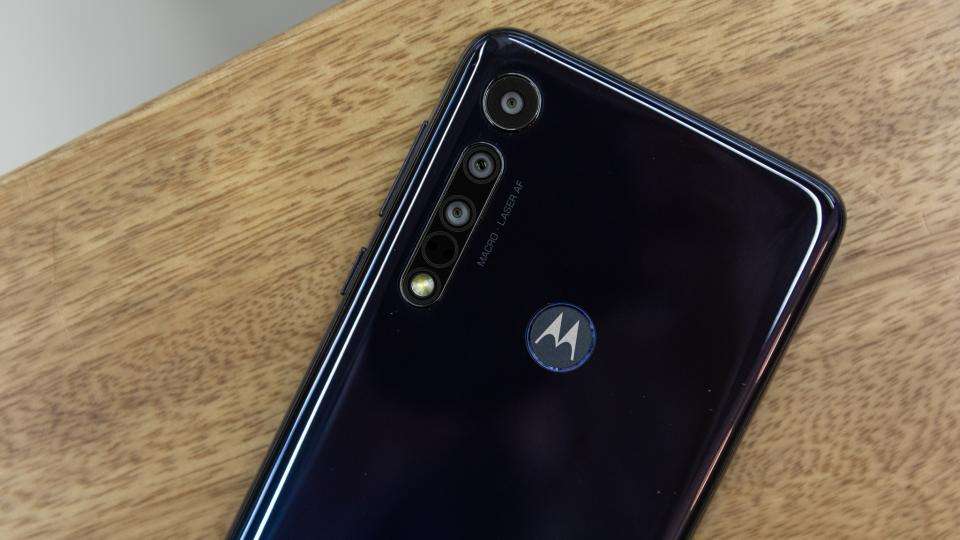Motorola’s smartphone output is unrelenting at the moment. All eyes might currently be fixed on the imminent Moto Razr revamp , but despite already amassing an exhaustive list of budget-friendly handsets, Motorola has launched yet another cheapo phone in an effort to get pulses racing before Christmas.
READ NEXT: Best budget smartphones
This one falls under the “One” range – a separate line-up from Moto’s popular G-series handsets , which, according to its makers, appeals more to the younger end of the market. And, admittedly speaking as a somewhat out-of-touch tech journalist, I reckon the Moto One Macro does exactly that – it’s a well-priced smartphone which focuses on close-up photography to help boost your Instagram game on the cheap.
Motorola One Macro review: What you need to know
Motorola’s aim, of course, is to do both of these things better than the competition. The Moto One Macro is designed as an attractive proposition for first-time buyers that aren’t tempted by the high-priced allure of flagship smartphones, opting instead for something that won’t break the bank but will take artsy pictures for all to admire.

And that’s kind of what the One Macro ends up offering. Other than the dedicated macro lens – which I’ll discuss in more detail later – it also benefits from a suite of cameras, including a regular 13-megapixel camera on the back and a 2-megapixel depth sensor to help with blurred background portraits.
The One Macro also has a 6.2in narrow-aspect IPS screen, with a resolution of 1,520 x 720. It uses a MediaTek P70 processor with 4GB of RAM and 64GB of storage and is fitted with a rather large 4,000mAh battery.
Motorola One Macro review: Price and competition
The key appeal with Motorola’s phones, of course, is how little they cost. The Moto One Macro certainly doesn’t deviate from the company’s tried-and-tested formula, but it isn’t the cheapest smartphone in its ever-bulging warehouse either. Should you manage to find one (it seems to be out of stock in some places at the time of writing) the Moto One Macro costs £179 .

That places it directly in the firing line of similarly lucrative budget options such as the Sony Xperia L3 and Nokia 6.2 , not to mention stiff competition from within Motorola’s own ranks; our current budget pick, the Moto G7 Power , goes for around £160 these days . If you can consider upping your budget a little, then the Moto One Action is also a superb choice, costing £220 .
Motorola One Macro review: Design and key features
If you really can’t stretch your budget any further, then the Moto One Macro is still a prime candidate for your cash. As far as appearances go, it is a bit basic. It doesn’t cost a lot, so this can be excused slightly, but we’ve recently seen rival manufacturers stretch their high-end design tendrils out into the budget space with miraculous-looking results.

The front isn’t bad at all. The 6.2in screen (almost) covers the entire surface of the phone, aside from the skinny side bezels and the circular drop notch eating its way into the top of the screen. This houses an 8-megapixel selfie camera – with the earpiece speaker just above it – and it’s a pretty neat setup considering the price.
However, the clearest sign of the One Macro’s budget lineage is its plastic rear. It lacks the sturdier “4D glass” construction of the One Action (though it does cost less) and the back of the phone flexes quite a bit when pressed. The glossy coating also picks up fingerprints, no end.
Despite the plastic housing, the Moto One Macro doesn’t have a removable back cover either, so you won’t be able to swap out the battery when it finally runs flat – something you’re able to do with the new Moto E6 Plus. You can, however, add up to an extra 512GB of microSD storage, or simply pop in a second nano-SIM.
The One Macro’s other physical details are precisely where you expect them to be. There’s a USB Type-C charging port on the bottom edge, which sadly only supports charging speeds up to 10W, while there’s a volume rocker and power button sensibly placed on the right side. You won’t need to ditch your wired headphones either, thanks to the top-mounted 3.5mm headphone jack.
Motorola One Macro review: Display
As for the screen, the One Macro has a 1,520 x 720 resolution IPS panel measuring 6.2in across the diagonal. This is actually one of the biggest displays in Motorola’s smartphone fleet, surpassed only slightly by the One Action, One Vision and G8 Plus.
When I put it through our display testing procedures, I found that the Moto One Macro was capable of a peak brightness of 577cd/m2 in auto – which makes for good viewing in the great outdoors – and it has a pin-sharp contrast ratio of 1,757:1.
However, one area where the Moto One Macro underperforms is in overall colour accuracy. According to our scrutinous ColorMunki colorimeter, the Macro’s screen produced an average Delta E of 3.02 in the phone’s ‘Boosted’ display profile, with clear evidence of undersaturation in dark red and light blue tones, along with heavily saturated light greens and purples.
In fact, the One Macro’s colour palette is a bit of a mess, and while you shouldn’t be overly critical of a phone this cheap, it’s not like Motorola has a long-standing record of bad budget screens. Let’s hope this one is a one-off, and it doesn’t help that it isn’t coated in a protective layer of Gorilla Glass, either. Not only is it more prone to scratches, but it also picks up fingerprints rather easily too – just like the back.
Motorola One Macro review: Performance and battery life
Moving things towards a more positive direction, the One Macro’s performance helps negate this slow erosion of its initial appeal. The internal specifications aren’t exactly mind-blowing, nor are they industry-leading, but where the mere mention of a MediaTek-powered handset would have forced you to run for the hills a few years ago, the new Helio P70 chipset has proved to be a solid performer for the price.
It’s certainly not the fastest, but it’s far from the slowest either – and I actually found it did a pretty good job in the Geekbench 4 tests, as you can see below (note: benchmarking was blocked on the Xperia L3). It’s on a par with the Moto G8 Plus’s performance, which uses a Qualcomm Snapdragon 665 and costs £60 more.
The One Macro isn’t quite as formidable when it comes to playing games, however, and you might have to temper your expectations with what you can play. It stormed through the GFXBench Manhattan 3.0 tests, but should you decide to throw anything more demanding at the embedded Mali-G72 GPU – like the recently-released Call of Duty Mobile – then you might need to drop your in-game graphics settings to achieve a playable frame rate.
Battery life, on the other hand, is astounding. That massive 4,000mAh battery is clearly doing its job, with the Moto One Macro reaching a total of 22hrs 37mins before the battery fully drained. Compare the numbers in our big data sheet, and the One Macro is the tenth longest-lasting smartphone we’ve ever tested, and it isn’t too far off the Moto G7 Power either.
It’s a bit of a shame, then, that when the phone does eventually run out of juice, it takes such a long time to charge it back up again. The Moto One Macro only supports charging speeds up to 10W, and it took 30mins worth of charge to reach 25% from zero.
Motorola One Macro review: Camera
As the name suggests, it’s all about macro photography with the One Macro. Well, it is with one of its three lenses, anyway: a 2-megapixel f/2.2 camera that lets you get as close as 2cm from your subject. The other two are a more conventional 13-megapixel f/2.0 main lens, complete with phase detection autofocus, and a 2-megapixel f/2.2 depth sensor for blurry background portraits. I’d have much preferred a more useful wide-angle or zoom sensor – especially as I’m not the type to post my mugshots online – but I suppose I’m just being picky.
Unsurprisingly, the macro camera is the real highlight here, and it was rather enjoyable testing it out on a variety of different objects. It’s a separate mode in the camera app, just one swipe away from the default shooting mode, and it also allows you to tinker with the usual selection of manual shooting settings, including exposure control, white balance, ISO and RAW capture.
Provided you have plenty of light (this is going to be a theme here), close-up pictures look superb, showing off lots of intricate details that you wouldn’t normally be able to capture. I captured a close-up picture of a £1 coin, for instance, from only 3cm away and you can clearly see the intricate writing and detailing across the edge.
The experience is more limited when the light begins to dim, however, and the 2-megapixel sensor clearly struggles in dark environments. Images are rather blurry, with unnaturally blown-out highlights. It’s a similar story with the other cameras too – the 13-megapixel camera is a cracking choice for scenery shots in the sun but isn’t quite as good at taking pictures of your house party (mis)adventures.
As for video, the Moto One Macro is limited to 1080p recording at 30fps, albeit fully stabilised. The footage looks crisp and clear, without a doubt, but I would have preferred a handful of extra shooting modes – especially as the Moto One Action can record at up to 4K resolution.
Motorola One Macro review: Verdict
It lives up to its name, but the Moto One Macro fails to deliver the goods in other, more important, areas. With Chinese manufacturers such as Xiaomi and Honor beginning to corner the low-end of the market, Motorola’s budget reign has begun to falter, and simply offering up a mixed bag of a smartphone won’t cut it in 2019.
In some areas, the Moto One Macro really shines, but with every single positive there’s a negative. It feels cheap, the battery takes forever to charge, and the display suffers from wildly inaccurate colours. It’s fun to shoot things up close, and it has a long-lasting battery, but that’s about all there is to it.
|
Motorola One Macro specifications |
|
Processor |
Octa-core 2GHz MediaTek Helio P70 (4x2GHz, 4x 2GHz) |
|
RAM |
4GB |
|
Screen size |
6.2in |
|
Screen resolution |
1,520 x 720 |
|
Pixel density |
270ppi |
|
Screen type |
IPS |
|
Front camera |
8MP (f/2.2) |
|
Rear camera |
13MP (f/2.0), 2MP (f/2.2) macro, 2MP (f/2.2) depth |
|
Flash |
LED |
|
Dust and water resistance |
No |
|
3.5mm headphone jack |
Yes |
|
Wireless charging |
No |
|
USB connection type |
USB Type-C |
|
Storage options |
64GB |
|
Memory card slot (supplied) |
microSD (512GB) |
|
Wi-Fi |
802.11b/g/n (single-band) |
|
Bluetooth |
4.2 |
|
NFC |
No |
|
Cellular data |
4G |
|
Dual SIM |
Yes (shared with microSD) |
|
Dimensions (WDH) |
158 x 75 x 9 mm |
|
Weight |
186g |
|
Operating system |
Android 9 |
|
Battery size |
4,000mAh |
